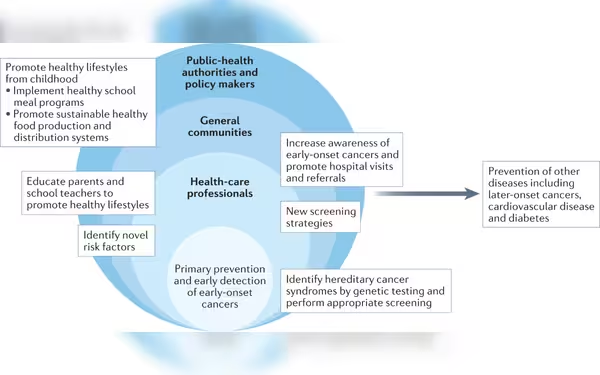Saturday, July 6, 2024 11:33 AM
Global Research Project Investigates Rise in Early-Onset Cancers
- Young adults worldwide facing increasing diagnoses of aggressive cancers
- Research project funded to explore lifestyle and environmental factors contributing to spike
- Diet, toxins, disrupted sleep, and gut microbiome under scrutiny as possible contributors
 Image Credits: Nature
Image Credits: NatureThe rise in early-onset cancers, particularly in the gastrointestinal system, prompts a $25 million global research project to investigate lifestyle and environmental factors. This collaborative effort aims to identify risk factors and mechanisms behind the surge, with a focus on diet, toxins, disrupted sleep, and gut microbiome. The goal is to develop improved screenings, treatments, and prevention strategies to address the increasing burden of cancer worldwide.
Princess Catherine's recent cancer diagnosis has shed light on a troubling trend: an increasing number of young adults worldwide are being diagnosed with aggressive cancers. This rise in early-onset cancers, particularly in the gastrointestinal system, has puzzled doctors and scientists alike.
A $25 million research project, funded by various organizations, aims to investigate the lifestyle and environmental factors contributing to this spike. Researchers from the US, Europe, and Asia will collaborate to identify potential risk factors and biological mechanisms behind early-onset cancers.
Factors such as diet, exposure to toxins, disrupted sleep patterns, and changes in the gut microbiome are being explored as possible contributors to the surge in cancer cases among younger individuals.
While obesity was once a primary risk factor, recent studies suggest that specific diets, including ultra-processed foods, and environmental exposures may play significant roles in the development of GI cancers.
As the incidence of early-onset cancers continues to rise globally, finding solutions becomes imperative not only for developed nations but also for developing countries facing similar environmental challenges. The research project aims to provide insights that could lead to improved screenings, treatments, and ultimately, a better understanding of how lifestyle and environmental factors impact cancer development.
The increase in early-onset cancers is a pressing issue that demands attention and collaborative efforts on a global scale. By unraveling the complexities of this trend, researchers hope to pave the way for more effective prevention and intervention strategies, ultimately aiming to reduce the burden of cancer on individuals and societies worldwide.













